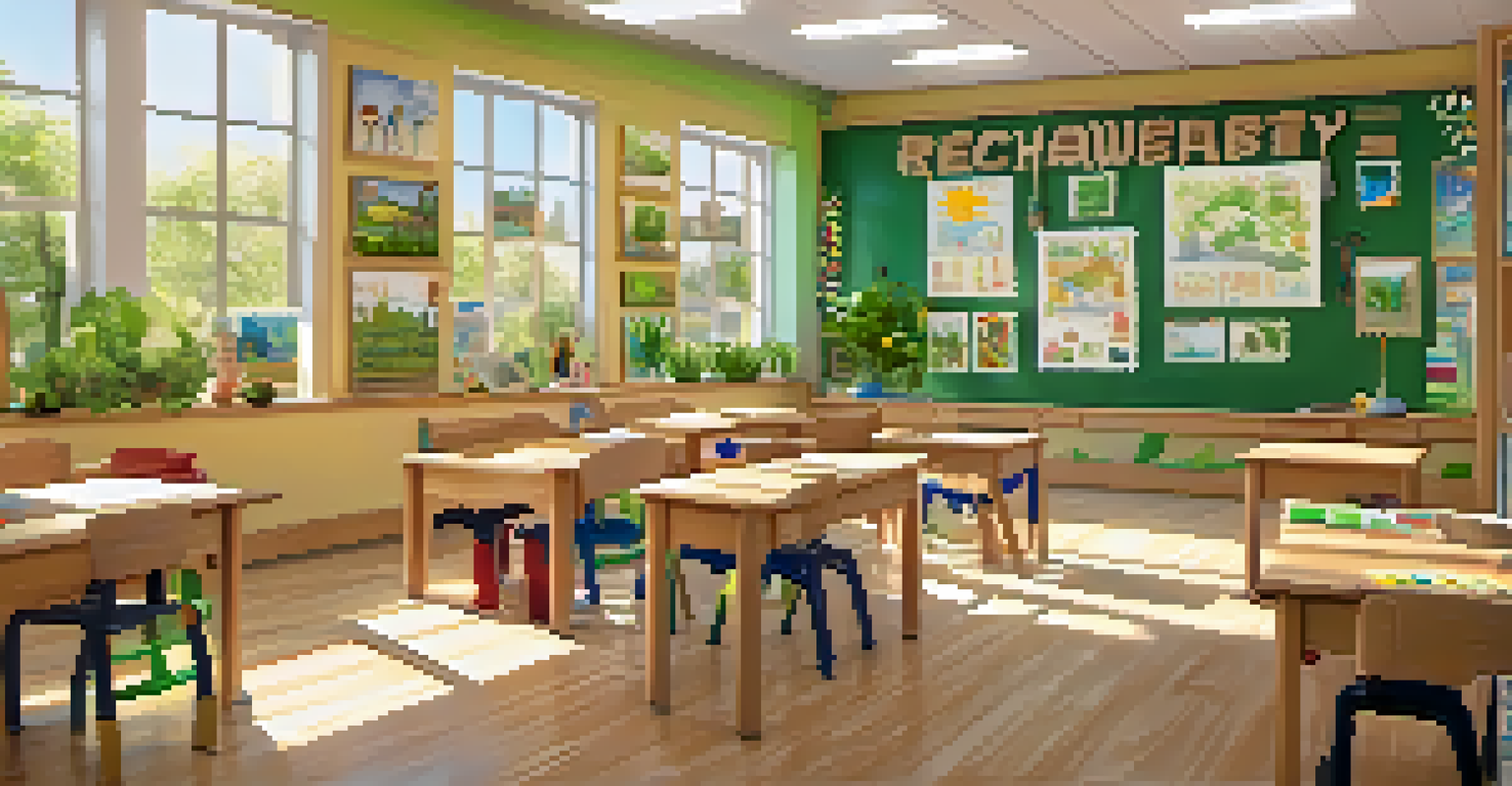Sustainability in Early Childhood Education Programs

Understanding Sustainability in Early Childhood Education
Sustainability refers to meeting our own needs without compromising future generations' ability to meet theirs. In early childhood education, this concept emphasizes the importance of teaching young children about environmental stewardship and responsibility. By integrating sustainability into the curriculum, educators can instill values that encourage children to care for their environment from a young age.
The greatest threat to our planet is the belief that someone else will save it.
These programs often focus on hands-on experiences that allow children to explore nature, understand ecosystems, and learn about the impact of human actions on the planet. For instance, simple activities like planting seeds or recycling can spark a child's curiosity and understanding of sustainability. This foundational knowledge is crucial as they grow and face environmental challenges.
Moreover, sustainability in education isn't just about the curriculum; it's about creating an eco-friendly learning environment. This can include using green materials, reducing waste, and promoting energy efficiency within classrooms. When children see their educators practicing sustainability, it reinforces the lessons they learn.
Benefits of Sustainable Practices in Early Education
Incorporating sustainable practices in early childhood education brings a host of benefits for both children and the environment. First and foremost, it fosters a sense of responsibility and awareness about ecological issues among young learners. This awareness can lead to more conscientious behaviors as they grow older, creating a ripple effect of positive change.

Moreover, sustainability in early childhood education can enhance children's cognitive and social skills. Activities like gardening promote teamwork and collaboration, while also developing fine motor skills and scientific thinking. Children learn to observe, predict, and experiment, which are essential skills for lifelong learning.
Nature-Based Learning Enhances Health
Engaging children in nature-based learning promotes physical activity and emotional well-being while fostering a love for the environment.
Lastly, sustainable practices can improve the overall health and well-being of children. By spending more time outdoors and engaging with nature, children can develop a deeper connection to the environment. This not only boosts their physical health but can also enhance their emotional and social development.
Creating Eco-Friendly Learning Environments
An eco-friendly learning environment is essential for promoting sustainability in early childhood education. This can start with the architecture and materials used in schools or daycare centers. Utilizing recycled materials, energy-efficient appliances, and natural lighting can significantly reduce the environmental footprint of these facilities.
Education is not the learning of facts, but the training of the mind to think.
Additionally, outdoor classrooms or green play areas can provide children with direct interaction with nature. These spaces can be designed to promote exploration and discovery, allowing children to learn about their surroundings. Nature-based play has been shown to improve children's physical health and stimulate their imaginations.
Educators can also encourage families to adopt sustainable practices at home. By providing resources and tips on eco-friendly living, schools can extend their impact beyond the classroom. This partnership between home and school creates a consistent message about the importance of sustainability.
Engaging Families in Sustainability Efforts
Families play a crucial role in reinforcing sustainability practices taught in early childhood education programs. Educators can engage families by hosting workshops or informational sessions focused on eco-friendly practices. This collaboration not only strengthens the home-school connection but also empowers parents to incorporate sustainability into their daily lives.
Moreover, schools can create take-home activities that encourage families to participate in sustainability initiatives. For instance, projects like family recycling days or community clean-up events can foster teamwork and shared responsibility. These activities not only educate but also build a sense of community around sustainability.
Community Involvement is Key
Involving families and communities in sustainability efforts reinforces eco-friendly practices and creates a culture of environmental stewardship.
By involving families, educators can help children see the importance of sustainability as a shared value. When children observe their parents making eco-friendly choices, it reinforces the concepts learned in school. This shared commitment is vital for creating a culture of sustainability both at home and in the community.
Incorporating Nature-Based Learning Approaches
Nature-based learning is an effective way to introduce sustainability concepts to young children. This approach focuses on using the natural environment as a classroom, allowing children to explore and learn through hands-on experiences. Activities like nature walks, outdoor play, and environmental observation can spark curiosity and foster a love for the outdoors.
By immersing children in nature, educators can teach them about ecosystems, biodiversity, and the interdependence of living organisms. For example, observing how plants grow and change with the seasons can help children understand life cycles and environmental changes. These lessons are often more impactful when experienced directly rather than through traditional teaching methods.
Furthermore, nature-based learning promotes physical activity and can enhance children's emotional well-being. Spending time outdoors has been linked to reduced stress levels and improved mood, making it an essential component of early childhood education. By prioritizing nature in learning, educators can nurture both the mind and body.
Challenges to Implementing Sustainability in Education
While the benefits of sustainability in early childhood education are clear, there are several challenges to its implementation. One significant hurdle is the lack of resources or training for educators. Many teachers are eager to incorporate sustainability into their programs but may not have the necessary knowledge or materials to do so effectively.
Additionally, funding can be a barrier to developing eco-friendly programs or facilities. Schools may struggle to secure the financial support needed to invest in sustainable practices, such as outdoor classrooms or green technology. This limitation can hinder their ability to make meaningful changes.
Sustainability Shapes Young Minds
Teaching sustainability in early childhood education instills ecological awareness and responsibility in children from a young age.
Lastly, balancing educational standards with sustainability goals can be difficult. Educators often face pressure to meet specific curriculum requirements, which may not always align with sustainability initiatives. Finding creative ways to integrate sustainability into existing frameworks is essential for overcoming this challenge.
Future Directions for Sustainable Early Childhood Education
The future of sustainable early childhood education looks promising as more educators recognize its importance. As awareness grows, we can expect to see an increase in programs specifically designed to teach sustainability. This shift will not only enhance children's learning experiences but also contribute to a more environmentally conscious generation.
Moreover, collaborations between schools, communities, and environmental organizations can lead to innovative sustainability initiatives. By pooling resources and expertise, we can create more comprehensive programs that address local environmental issues while educating children. These partnerships can amplify the impact of sustainability efforts.

Finally, ongoing research and advocacy will be crucial in shaping the future of sustainability in education. By sharing success stories and effective practices, educators can inspire one another and elevate the importance of sustainability. As we move forward, creating a culture of sustainability in early childhood education will be key to nurturing a greener future.